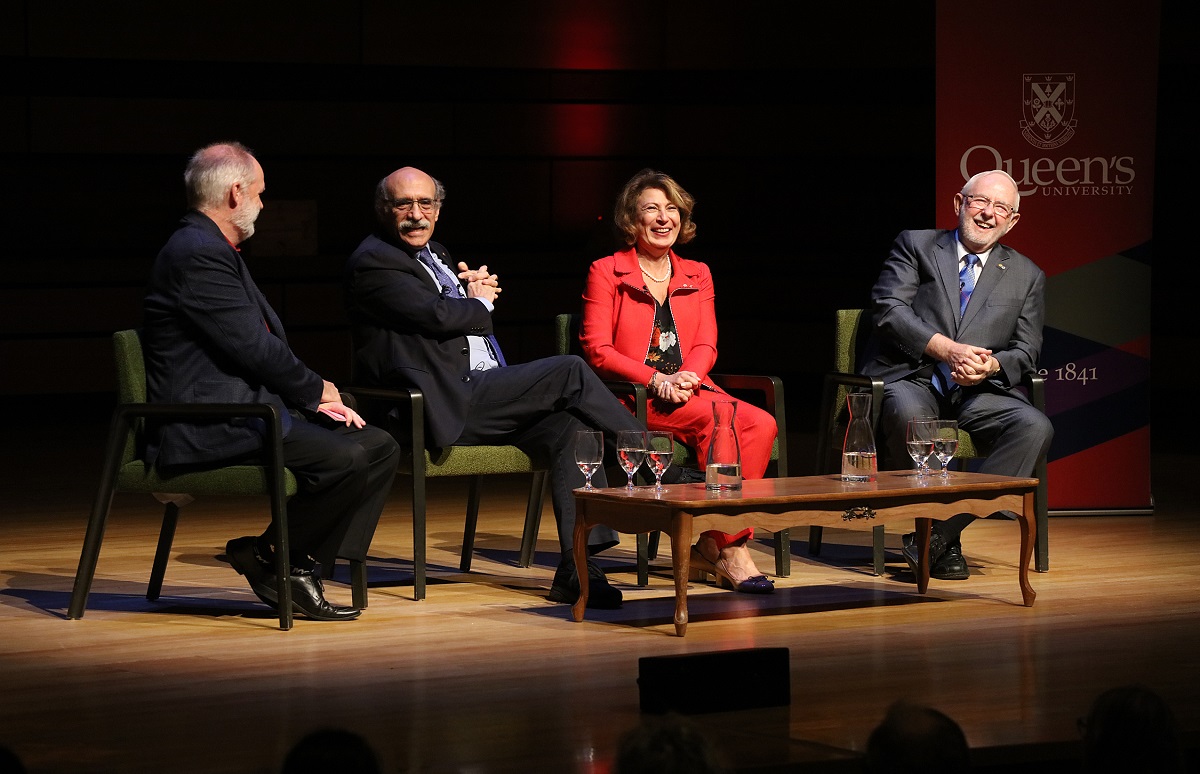NSERC research award renamed after Queen’s University Nobel Laureate
![[Photo of Arthur McDonald]](/research/sites/default/files/assets/news_story/Discover-Research-Covid19-D-ArtMcDonald-1000x667%282%29.jpg)
Queen’s University Nobel Laurate Arthur McDonald has been honoured by the Natural Sciences and Engineering Research Council of Canada (NSERC) with a national prize in his name.
The Arthur B. McDonald Fellowships will recognize early-stage academic researchers in the natural sciences and engineering and support them to enhance their research capacity, so that they can become global leaders in their field. Worth $250,000 over two years, these awards were previously known as the EWR Steacie Memorial Fellowships and 10 have previously been awarded to Queen’s researchers including John Smol, Troy Day, Ahmed Hassan, and Peter Boag.
Unlike NSERC’s other prizes, which recognize previous research accomplishments, the McDonald Fellowship supports ongoing and future research and therefore comes with an additional grant of up to $180,000 to the winner’s university to fund a replacement for the winner’s teaching and administrative responsibilities.
This is a tremendous honour from NSERC,” says Dr. McDonald. “I am particularly pleased because these fellowships will support early-stage academic researchers at a critical point in their careers. I know that there will be wonderful results in future from these creative young Fellows who will be given time and resources to pursue an innovative new idea.”
Joining Queen’s in 1989 as a professor in the physics department, Dr. McDonald worked as the director of the Sudbury Neutrino Observatory (SNO), the world’s deepest underground laboratory. The SNO team discovered that neutrinos – sub-atomic particles considered the basic building blocks of the universe – change from one type to another on their journey to Earth from the sun. This finding confirmed that these fundamental particles have a finite mass and that the current models for energy generation in the sun are very accurate.
For his research efforts, Dr. McDonald was named the co-winner of the 2015 Nobel Prize in physics for SNO’s research into neutrinos.
“The Queen’s community and Canadians continue to be inspired by the work of Dr. McDonald and his collaborators in helping us understand the fundamental building blocks of the universe,” says Kimberly Woodhouse, Vice-Principal (Research). “Throughout his career, Dr. McDonald has been a mentor and advocate for early-stage researchers across disciplines, and his name being attributed to this award is very fitting.”
A second Nobel Laureate, Donna Strickland also had an NSERC award named in her honour. The NSERC Donna Strickland Prize for Societal Impact of Natural Sciences and Engineering Research will be awarded annually to an individual or team whose outstanding research has led to exceptional benefits for Canadian society, the environment and/or the economy.
Learn more about Dr. McDonald’s Path to the Nobel.
Nobel Prize Inspiration Initiative at Queen's University
The path to research success includes many ups and downs and can take you to unexpected places. On September 25th, 2019, Queen’s University hosted the Nobel Prize Inspiration Initiative, featuring Martin Chalfie, 2008 Nobel Laureate in Chemistry. In a public dialogue moderated by preeminent journalist, André Picard, Dr. Chalfie was joined by Queen’s researcher Dr. Arthur McDonald, 2015 Nobel Laureate in Physics, and Dr. Mona Nemer, Chief Science Advisor to the Government of Canada, to discuss the path to the Nobel Prize and research success. The event provided a unique and exclusive opportunity for students, researchers, and community members to interact with some of the most recognized members of the international research community.
Arthur B. McDonald Canadian Astroparticle Physics Institute
The Arthur B. McDonald Canadian Astroparticle Physics Research Institute is a national hub for astroparticle physics research, uniting researchers, theorists, and technical experts within one organization.
Queen’s University led 13 Canadian institutions in creating the centre’s predecessor organization in 2015. The McDonald Institute, officially launched in 2018, works to enhance Canada’s global leadership in the field, which includes dark matter and neutrino research.



![Dr. Margaret Moore [Dr. Margaret Moore]](https://www.queensu.ca/research/sites/all/modules/contrib/lazyloader/image_placeholder.gif)